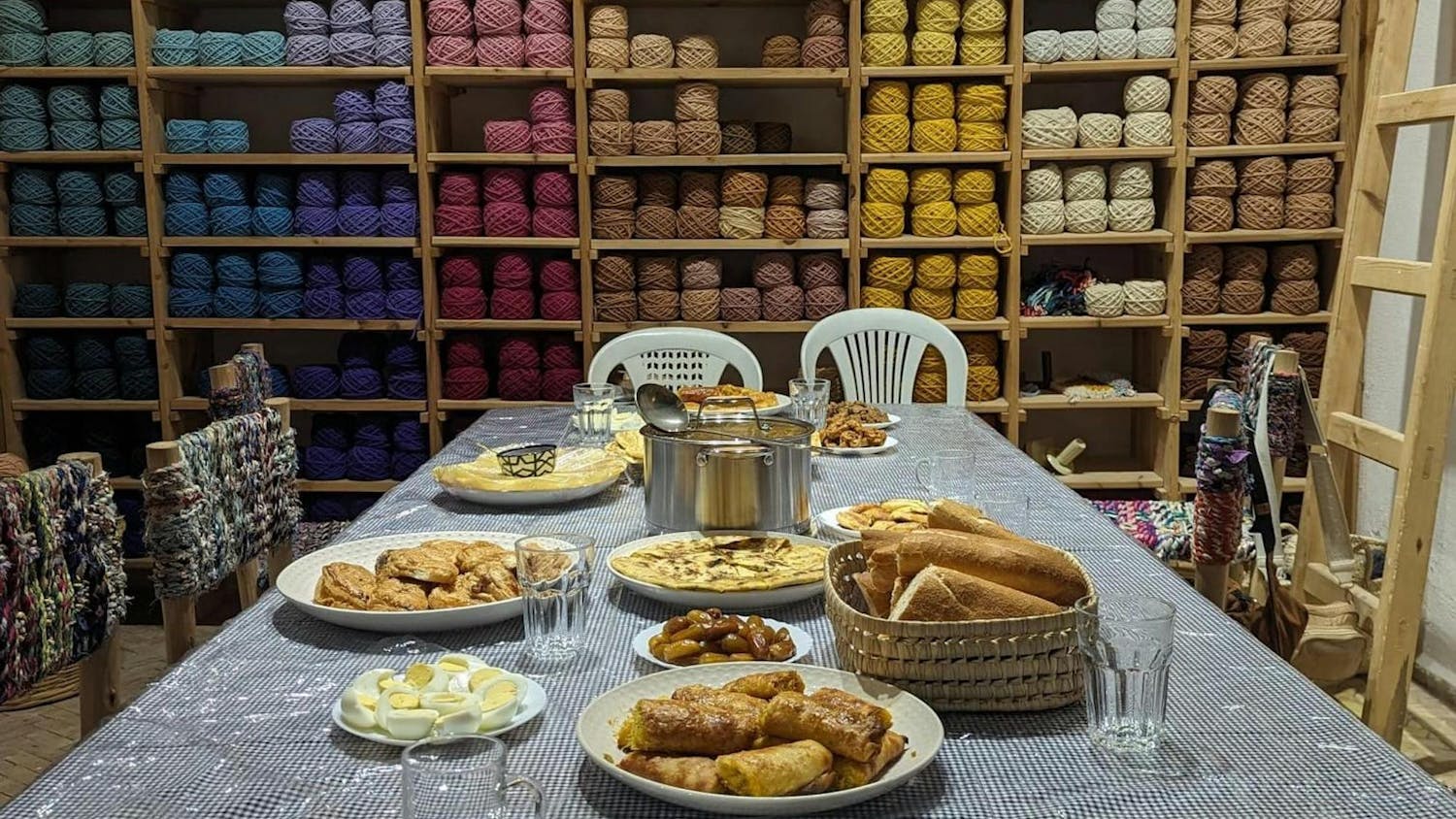Each Saturday at 9 a.m., while their peers on campus largely remain asleep, a group of Tufts students package and distribute food to about 90 to 170 families. This is one part of Building Audacity’s expansive food justice work, which runs in parallel with the organization’s other programs that address the intersectional needs of the communities it serves.
Building Audacity is a Black-founded, Black-led nonprofit that supports youth-led changemaking. Nakia Navarro, founder and ‘lead trouble maker’ at Building Audacity (AG ‘18, AG ‘20), explained the issues that motivated the organization’s creation, which seeks to empower youth ages 11 to 25, among other programs.
“I have been a teacher for a while, I have been executive director for different youth-focused organizations, and I always kept seeing the same things and having the same qualms about the organizations,” Navarro said. “They didn’t really know how to allow youth to lead. Also, they didn't really make space for the Black and brown youth that they said that they were holding space with and for. That’s why I started Building Audacity — to really make space for youth to organize on their own terms for the issues that they felt to be most important.”
Building Audacity is engaged in a wide variety of youth-led projects, ranging from Civically Speaking!, a podcast that holds public officials accountable; to COVID-19 response efforts that encompass food distribution, education and rent assistance; to the Jean Charles Academy, a dual-language school in Lynn, MA that centers the experiences of Black, Latinx and Asian students, founded by Navarro. The vast array of programs at Building Audacity, not limited to those above, evolve according to youth input and community needs. A common thread unites the organization’s work: a focus on bringing marginalized voices to the forefront.
“We’re speaking to apartheid, we're speaking to food sovereignty, we're speaking to allowing people to … liberate themselves and do it on their own terms,”Navarro said.
Three Tufts students have mobilized behind this mission. René LaPointe Jameson, Shariqa Rahman and Flor Delgadillo help run On The Grow, Building Audacity’s food justice program.
Jameson, the food justice projects coordinator at Building Audacity, discussed how On The Grow started during the pandemic, during which food insecurity in Massachusettsdoubled. Organizers surveyed families and found that people overwhelmingly said they needed food.
“While COVID has exacerbated food access and food inaccess, it's just elaborating on existing conditions that were unjust. I think On The Grow … is really about responding to inequitable community development around food access and, again, the denying of communities affordable, sustainable and reliable access to particularly fresh food and fresh, culturally specific food,” Jameson said.
Since its inception, On The Grow has served over 650 families, with the number varying throughout the pandemic. It is an overarching umbrella for a collection of initiatives, including ongoing food distribution efforts, hydroponic farming, agricultural tech business programming and the eventual retrofitting and redesign of RVs and buses to create mobile food distribution centers.
Building Audacity has organized dozens of food distributions throughout the pandemic staffed by hundreds of volunteers, including Tufts students, students from other universities and members of the Greater Boston community. This semester, distribution has taken place on Saturdays from the Baronian Field House and has involved partnerships with various student organizations at Tufts, including Tufts Labor Coalition, Tufts Asian Student Coalition, Tufts Students for Justice in Palestine and the Tufts Food Rescue Collaborative.
Leila Skinner, a former food infrastructure intern at Building Audacity and outgoing co-coordinator of the Van Rescue chapter of Tufts Food Rescue Collaborative, shared her perspective on the partners’ roles in weekly food distribution.
“[Building Audacity] partners with all sorts of organizations, and I see our role as those organizations is to step up and support — that’s kind of the bare minimum that we could do. So Building Audacity organizes the facilities, outreach and ordering hundreds of dollars of groceries, and we just show up. Building Audacity does an amazing job … of really being like, ‘What do people actually want to eat?’ … Not just focusing on white Americans’ needs, but really focusing on, I believe, a largely Latinx and Black population’s desires,” Skinner said.
Another prong of On The Grow consists of hydroponic farming centers based out of the Jean Charles Academy. In 2021, the spaces received over $20,000 from the Tufts Green Fund as part of a winning project proposed jointly by Jameson and Kevin Cody, the Hoch Cunningham professor of the practice in food systems in the environmental studies program. The project aims to address food apartheid and increase urban farming and access to fresh produce in Boston.
According to Navarro, the center yields 40 pounds of produce per 5 square feet. The potential of multiplying this scale is significant; 20,000 square feet of space could yield over 100,000 pounds of food every four weeks.
“That’s massive in regards to food sovereignty because the people that grow these foods don’t have access to land, so growing hydroponically is, to me, the future. If we want to stop hunger, we’ve got to make sure the people who are hungry know how to grow and can sustain themselves and have choice on what they eat,” Navarro said.
Eventually, Building Audacity plans to open a retail space: a co-op grocery store in Lynn, MA, where the produce sold is hydroponically grown. Down the line, the organizers also envision phasing out purchased groceries in the distribution program and replacing them with self-grown hydroponic produce.
Delgadillo, a Building Audacity accomplice who manages the hydroponic systems at the Jean Charles Academy, explained the importance of the center’s focus on educating students on agriculture and food access.
“In terms of sustainability and even for our own personal care, having kids at such an early age … be aware that they can grow their own food … I think that’s a really big thing overall,” Delgadillo said.
Delgadillo also explained that while the technical, engineering-related aspects of hydroponics may seem intimidating to those from nonscientific backgrounds, she strives to make it a collaborative, creative process.
“It’s about … creative ways to think about sustainability and access to food, and I think that really, at the core of it, that’s what Building Audacity is about,”Delgadillo said.
According to Jameson, a combination of factors makes On The Grow’s food justice strategy unique: its youth-led approach, its promotion of food sovereignty and empowerment and its culturally specific produce, which is driven by community need and want, measured through surveys.
Rahman, an accomplice at Building Audacity who coordinates logistics for the food distribution program, explained the importance of listening to the community.
“Having the family feedback really allows us to make sure that … we're centering their needs first. I think a lot of organizations inadvertently, with soup kitchens and things like that, when [they] get donations from a group of people that are of a different class or background, they don't really understand the most pressing needs of the community,” Rahman said.
Jameson elaborated on what food sovereignty means in practice.
“We work in solidarity and in collaboration amongst and with different communities of color. I think it's important that members of their own communities are leading these initiatives, that it's particularly not waiting around for white people who have generational wealth and often economic privilege, and still do, to save us or help us,” Jameson said. “This is us doing our own work and responding to, again, continuous maltreatment in food access and community development.”
Jameson, Rahman and Delgadillo all stressed the need for more volunteers; they encouraged Tufts community members to join them for food distribution on Saturdays at 9 a.m. at the Baronian Field House. They especially seek more volunteer drivers and will reimburse for gas and Zipcar costs. They also look to continue developing partnerships with groups on campus.
“We're just really grateful for those club members and groups for … understanding that their work coincides with ours and that, again, these issues are so intersectional, that they’re all related,” Jameson said. “Putting in the effort to actually show up on a Saturday morning … that’s great.”





